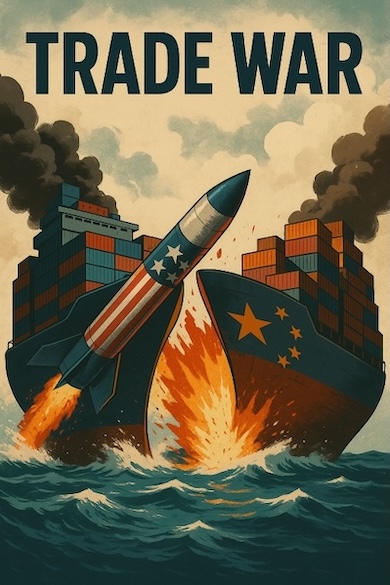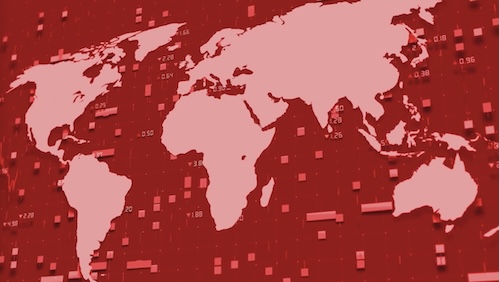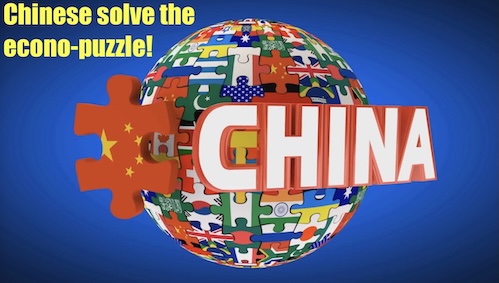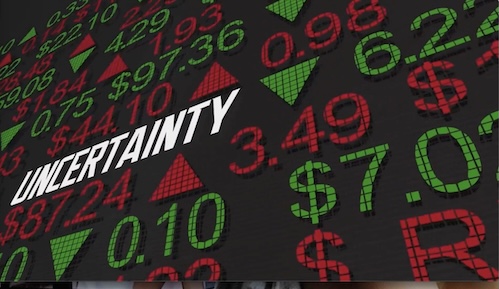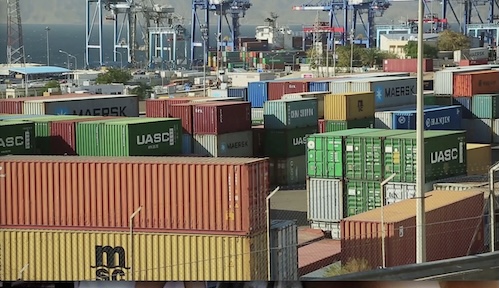A New Era of Chaos and Distrust is Shaping!
The issues discussed on "A New Era of Chaos and Distrust is Shaping!" impact all of us. Understanding them is the first step toward change. These issues include, but not limited to the following:
- * Economic Uncertainty and Inflation Pressures
- * Geopolitical Tensions and Shifting Alliances
- * Impact of Armed Conflicts on Global Stability
- * Financial Fragmentation and Market Volatility
- * Populism and Policy Shifts
- * Role of Technology and Cybersecurity
- * The Heating World by Climate Change
- * Social Affairs and Refuge Issues
- * Inequality and Injustice in Many Places
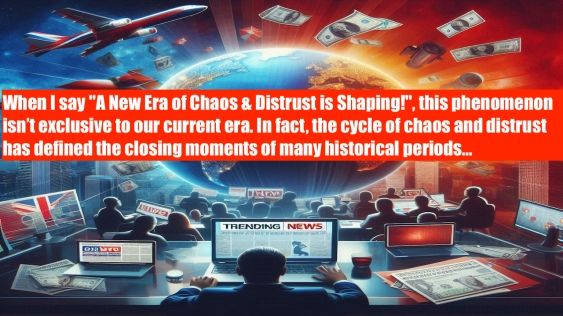 A New Era of Chaos and Distrust is Shaping! In fact, chaos & distrust were also characteristic in many historical eras.
A New Era of Chaos and Distrust is Shaping! In fact, chaos & distrust were also characteristic in many historical eras.The page is also one of the following pages that interconnect with each other and reflect on historical interconnected issues that continue to impact our lives through the years.
- Why Expanding Horn Africa to Include Other States and Global Impacts?
- Pre-Cold War Era of Colonialism & Imperial Rivalries!
- Pre-Cold War American Expansionism!
- The Cold War Era: A Battle of Ideologies and Influence!
- Why Do Nations Fragment When Unity is Their Greatest Strength?
- The Sudanese Muslim Brothers and the U.S. have Created Int Terrorism!
- Eritrea Was Too Late to Independence Due to Colonial Conspiracies!
- Namibian Road to Independence From Liberation to Sovereignty!
- The Post-Cold War Era: A Shifting Global Landscape!
- How Economics, Ideology, and Geopolitics Fragment Nations and Create New Ones
- New World Order - Stability or Chaos?
- Why Am I Saying A New Era of Disorder and Doubts is Shaping?
The Complexity of Economic, Geopolitical, and Conflict-Driven Challenges Today!
The modern world is shaped by an intricate web of economic instability, geopolitical tensions, and ongoing conflicts. These challenges are deeply interconnected, influencing global markets, trade policies, and international relations. Understanding their complexity is crucial for policymakers, businesses, and individuals navigating an uncertain future.
1. Economic Uncertainty and Inflation Pressures
Global economies are facing persistent inflation, fluctuating interest rates, and supply chain disruptions. Central banks are adjusting monetary policies to stabilize markets, but uncertainty remains. The rise of protectionist policies and trade restrictions further complicates economic recovery, affecting industries worldwide.
2. Geopolitical Tensions and Shifting Alliances
The geopolitical landscape is undergoing significant transformations. Rivalries between major economies, such as the U.S. and China, are reshaping trade agreements and financial systems. Additionally, regional conflicts and political instability are influencing global energy markets, cybersecurity concerns, and diplomatic relations.
3. The Impact of Armed Conflicts on Global Stability
Ongoing wars, such as the Russia-Ukraine conflict and tensions in the Middle East, and rebels groups in Africa, are disrupting trade routes, increasing inflationary pressures, and affecting global security. Maritime transport disruptions in strategic regions further complicate supply chains, leading to economic slowdowns in affected areas.
4. Financial Fragmentation and Market Volatility
Geopolitical risks are causing shifts in international financial systems, leading to reduced capital flows and increased volatility in emerging markets. Countries are reassessing their economic dependencies, with some prioritizing domestic industries over global trade partnerships.
5. Populism and Policy Shifts
Governments implementing short-term economic policies, such as trade protectionism and fiscal expansion, may create instability in global markets. Trade Wars have raised these economic difficulties when the American tariffs imposed on China has reflected on global markets everywhere.
6. The Role of Technology and Cybersecurity
As digital infrastructure becomes more critical, cyber threats are escalating. Governments and corporations are investing in cybersecurity measures to protect financial systems, sensitive data, and national security interests. The rise of cyber warfare adds another layer of complexity to global stability.
The challenges of economic instability, geopolitical tensions, and conflicts are deeply intertwined, shaping the future of global governance and financial systems. Addressing these issues requires strategic economic policies, diplomatic efforts, and technological advancements to mitigate risks and promote stability.
How Uncertainty and Inflation Pressures are Being Shaped?
Globally, economic uncertainty and inflation pressures are being shaped by trade tensions, policy shifts, and financial market volatility. The International Monetary Fund (IMF) warns that global growth is expected to decline, with inflation easing at a slower pace than anticipated. Trade wars and tariff increases have disrupted supply chains, raising production costs and contributing to inflationary pressures.
Central banks are responding in different ways. The Bank of England (BoE) is expected to cut interest rates to stimulate growth, while the U.S. Federal Reserve has kept rates unchanged due to concerns about stagflation. Meanwhile, the OECD highlights that inflation remains persistent, particularly in services and goods sectors, despite overall economic growth slowing.
Trade restrictions and geopolitical instability continue to add uncertainty, making it harder for businesses and consumers to plan ahead. The United Nations reports that tariff-driven price increases are hitting developing economies especially hard, exacerbating inflation risks.
How These Economic Trends Might Evolve in the Coming Years?
Looking ahead, global economic uncertainty and inflation pressures are expected to persist due to shifting trade policies, financial market volatility, and geopolitical tensions. The International Monetary Fund (IMF) projects that global growth will decline, with downside risks intensifying as major policy shifts unfold. Inflation is expected to ease, but at a slower pace than previously anticipated, as trade restrictions and financial adjustments continue to shape the economic landscape.
The Organisation for Economic Co-operation and Development (OECD) highlights that inflation remains persistent, particularly in services and goods sectors, despite overall economic growth slowing. Trade fragmentation and policy uncertainty are contributing to higher costs for production and consumption, making it harder for businesses and consumers to plan ahead.
Meanwhile, the United Nations (UN) warns that escalating trade tensions are sending shockwaves through the global economy, with tariff-driven price pressures adding to inflation risks. Developing economies are particularly vulnerable, as rising trade barriers and financial instability threaten growth prospects.
To navigate these challenges, policymakers are urged to promote a stable and predictable trade environment while addressing structural imbalances. Strategies such as enhancing labor force participation, integrating migrants and refugees, and mitigating skill mismatches could help stimulate growth and ease fiscal pressures.
Defining Economical Instability!
Economic instability refers to unpredictable fluctuations in financial systems that disrupt growth, employment, and consumer confidence. Here are some key aspects:
- Business Cycle Fluctuations: Periods of economic expansion and contraction create uncertainty, making it difficult for businesses to plan investments.
- Inflation: Rising prices reduce purchasing power, making goods and services more expensive. High inflation can lead to increased interest rates, discouraging borrowing and investment.
- Unemployment: Economic downturns often result in job losses, reducing consumer spending and increasing reliance on government support.
- Financial Market Volatility: Stock market instability and currency fluctuations can impact investor confidence and economic growth.
- Impact on Families: Low-income households experience financial instability due to unpredictable wages, fluctuating benefits, and housing insecurity.
What are the Main Causes of Economic Instability?
Economic instability arises from various factors that disrupt financial systems and economic growth. Some of the main causes include:
- Fluctuations in Stock Markets: Sharp declines in stock prices can reduce consumer confidence and trigger recessions.
- Changes in Interest Rates: Sudden increases in interest rates can make borrowing more expensive, slowing down investment and economic activity.
- Housing Market Crashes: A significant drop in home prices can lead to financial losses for banks and homeowners, reducing spending and investment.
- Global Financial Crises: Events like the 2008 financial crisis, caused by excessive speculation and risky lending, can lead to widespread economic instability.
- Trade Imbalances: When a country imports more than it exports, it can create financial strain and weaken its economy.
- Black Swan Events: Unpredictable events such as pandemics, natural disasters, or geopolitical conflicts can disrupt economies and cause instability.
Examples of Recent Economic Instability!
Here are some recent examples of economic instability:
- Inflation and Cost-of-Living Crises: Many countries have faced high inflation rates, leading to increased costs for essential goods and services. This has put pressure on households and businesses, affecting consumer spending and economic growth.
- Financial Market Volatility: Stock markets have experienced fluctuations due to uncertainty in global trade, interest rate changes, and geopolitical tensions.
- Debt Crises: Some nations have struggled with high levels of debt, leading to concerns about financial stability and potential defaults.
- Global Supply Chain Disruptions: Events such as conflicts, trade restrictions, and climate-related disasters have disrupted supply chains, affecting industries worldwide.
You don't have to be an economist to understand all these economical points. But, you will feel them in your daily life and then understand how these points work to impact your life.
The Causes of Inflation!
Inflation occurs when the prices of goods and services rise over time, reducing the purchasing power of money. Here are some key causes:
- Demand-Pull Inflation: When demand for goods and services exceeds supply, businesses raise prices. This can be driven by increased consumer spending, government expenditure, or business investments.
- Cost-Push Inflation: Rising production costs, such as wages, raw materials, or energy force businesses to increase prices to maintain profitability.
- Monetary Policy: Excessive money supply in an economy can lead to inflation, as more money chases the same amount of goods and services.
- Supply Chain Disruptions: Events like natural disasters, geopolitical conflicts, or trade restrictions can reduce supply, leading to higher prices.
- Expectations of Inflation: If businesses and consumers anticipate rising prices, they may adjust wages and costs accordingly, creating a self-fulfilling cycle.
How Does Economic Instability Affect Different Social Classes?
Through the definitions of social classes you can see how economic instability affects all of the social classes and which social class is hit hard by instability... a matter that points at inequality and in some cases regarding the work class results in injustice.
- Low-Income Families: These households experience the most severe impact, facing job insecurity, fluctuating wages, and difficulty affording basic necessities. Economic instability can lead to housing insecurity, food shortages, and limited access to healthcare.
- Middle Class: Economic downturns can erode savings, reduce job stability, and make homeownership more challenging. Rising costs of living and stagnant wages can push middle-class families into financial uncertainty.
- Upper Class: While wealthier individuals may be less affected by immediate economic instability, market volatility can impact investments and business profitability. However, they often have financial buffers to weather downturns.
How Do These Tensions Specifically Impact Emerging Markets?
Emerging markets are particularly vulnerable to economic and geopolitical tensions, as they often rely on global trade and investment for growth. Here are some key impacts:
- Trade Disruptions: Tariff hikes and trade restrictions, such as recent U.S. tariffs, can slow exports and reduce foreign investment in emerging economies.
- Currency Volatility: Geopolitical uncertainty can lead to fluctuations in exchange rates, making imports more expensive and increasing inflation.
- Investor Risk Aversion: Uncertainty in global markets can cause investors to withdraw capital from emerging economies, leading to financial instability.
- Sector-Specific Challenges: Industries like manufacturing and technology may struggle with supply chain disruptions, while services sectors may remain more resilient.
- Geopolitical Conflicts: Regional tensions, such as those between India and Pakistan, can affect investor confidence and government spending priorities.
The Long-term Effects of Financial Fragmentation!
Financial fragmentation refers to the breakdown of global financial integration, where cross-border capital flows, trade, and investment become increasingly restricted due to geopolitical tensions, regulatory barriers, or economic policies. While short-term disruptions are evident, the long-term consequences of financial fragmentation can reshape global markets, economic stability, and international cooperation.
1. Reduced Cross-Border Investment
One of the most significant long-term effects of financial fragmentation is the decline in cross-border investment. As geopolitical tensions rise, countries may impose restrictions on foreign investments, leading to reduced capital flows. Emerging markets, which rely heavily on foreign direct investment (FDI), may experience slower economic growth and limited access to global financial resources.
2. Increased Market Volatility
Fragmentation can lead to heightened financial market volatility. With reduced international risk diversification, investors may face greater uncertainty, causing fluctuations in stock markets, exchange rates, and bond yields. This instability can discourage long-term investments and hinder economic development.
3. Higher Borrowing Costs
As financial fragmentation disrupts global banking networks, borrowing costs for businesses and governments may rise. Countries with weaker financial systems may struggle to access affordable credit, leading to reduced infrastructure development, slower innovation, and constrained economic expansion.
4. Shift in Global Trade Dynamics
Financial fragmentation often coincides with trade restrictions and protectionist policies. Countries may prioritize domestic industries over international trade, leading to inefficiencies and reduced competitiveness. Over time, this shift can alter global supply chains, forcing businesses to adapt to new trade routes and partnerships.
5. Impact on Emerging Markets
Emerging economies are particularly vulnerable to financial fragmentation. With limited access to international capital, these markets may experience slower growth, currency instability, and reduced investor confidence. The long-term effects could include weaker financial institutions and increased reliance on domestic resources.
6. Decline in Global Cooperation
Financial fragmentation can erode international cooperation, making it more challenging for countries to address global economic challenges collectively. Institutions such as the International Monetary Fund (IMF) and World Bank may struggle to implement coordinated policies, leading to fragmented responses to crises.
The long-term effects of financial fragmentation extend beyond immediate disruptions, shaping the future of global finance, trade, and economic stability. While some nations may seek self-sufficiency, the interconnected nature of modern economies suggests that collaboration remains essential for sustainable growth. Addressing financial fragmentation requires diplomatic efforts, policy adjustments, and innovative solutions to maintain stability in an evolving global landscape.
A New Era of Chaos and Distrust is Shaping: Economic Crossfire: Avoid Ripple Effects! [Latest on The Insight Lens: 2025-04-17] Support me here Follow the Insight Lens
A New Era of Chaos and Distrust is Shaping: Trump's Trade War: Economic Shockwaves Across the Globe! [Latest on The Insight Lens: 2025-04-17]
A New Era of Chaos and Distrust is Shaping: Trade Wars: Global Economy's Rollercoaster Ride! [Latest on The Insight Lens: 2025-04-17]
A New Era of Chaos and Distrust is Shaping: Bee Crisis: Government Cuts Sting Hard! [Latest on The Insight Lens: 2025-04-17]
A New Era of Chaos and Distrust is Shaping: Trade Wars: How They Hit U.S. Tourism Hard? [Latest on The Insight Lens: 2025-04-17]
A New Era of Chaos and Distrust is Shaping: Trade Wars Aftermath: Global Economies on the Edge! [Latest on The Insight Lens: 2025-04-17]
A New Era of Chaos and Distrust is Shaping: What If Trade Wars Were Like Beekeeping? [Latest on The Insight Lens: 2025-04-18]
A New Era of Chaos and Distrust is Shaping: Biovians Speak: Trade Wars & Climate Crisis Through Nature’s Voice [The Insight Lens: 2025-04-24]
A New Era of Chaos and Distrust is Shaping: Trade Wars - Trump's Visa Crackdown: Impact on International Students [The Insight Lens: 2025-04-18]
A New Era of Chaos and Distrust is Shaping: Trade Wars - Trump Tariffs: Protests, Politics, and Future Impacts! [Latest on The Insight Lens: 2025-04-18]
A New Era of Chaos and Distrust is Shaping: Trade Wars and Tumult: Inflation's Reign and Recession's Grip! [Latest on The Insight Lens: 2025-04-19]
A New Era of Chaos and Distrust is Shaping: Trade Wars Reflect The Hidden Agenda of Free-Market Capitalism! [Latest on The Insight Lens: 2025-04-19]
A New Era of Chaos and Distrust is Shaping: Trade Wars from History to Cultural Shock! [Latest on The Insight Lens: 2025-04-19]
What Do You Think of "A New Era of Chaos and Distrust is Shaping"?
It is important to know what you think of "A New Era of Chaos and Distrust is Shaping"! This will enrich insightful discussion, so we arrive into shared grounds to make our world better.
Have A Great Story About This Topic?
Do you have a great story about this? Share it!
Did you get any of my books from Apple Books?
Click here to tell me & get some free books. Fill the form.
رواية "الموتُ شرقاً" تكشف لك سرّ الموت الشرقي التراجيدي المستمر للإنسان
احصل علي الرواية الآن واكتشف إنهيار القواسم المشتركة، واستلهم إبداعا يشبه الأسطورة في النص الروائي
"Follow", "like", "tweet", or "pin" the pictures to express your love! Thanks
TweetHorn Africa's Political Tragedy
Love in the Internet Time on Apple Books
Rising of the Phoenix Poetry on Apple Books
Free Poetry Picture Book
Free poetry picture book on Apple Books. You can use the images on public places for your customers to enjoy, while taking coffee.
The French & Spanish Versions
You can work the French versions and the Spanish versions of the two books above with me on, one on one bases. Contact Us.
HOAs Political Poetry Imaged
I'll be thankful, if you get one of my books.
My Books!
Publish Your BookLet's be the publishers of your book. Use the form at Contact Us.

